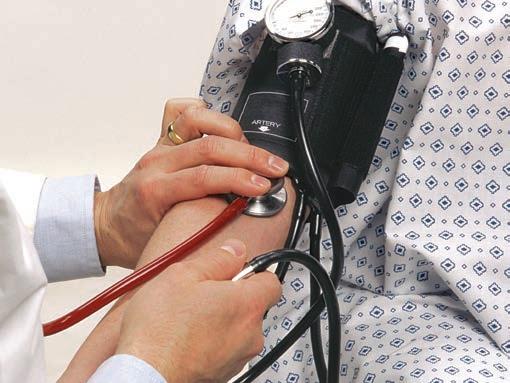
4 minute read
Reducing Your Risk of Complications
Controlling blood glucose, blood pressure, and cholesterol can help reduce the risk of long-term complications of diabetes. Talk to your health care provider to learn more, and keep track of your blood pressure and cholesterol levels with the charts on page 65.
Heart Disease and Stroke
Diabetes is itself a risk factor for heart disease and stroke. Heart attack and stroke affect people with diabetes more than twice as often as people without diabetes.
In fact, two out of three people with diabetes die from heart disease or stroke, which are together called cardiovascular disease. Clogged blood vessels can lead to heart attack, stroke, and other problems.
Heart Disease
Coronary artery disease, sometimes called hardening of the arteries, is caused by narrowing or blocking of the blood vessels that go to your heart. Your blood carries oxygen and other needed materials to your heart. If the blood vessels to your heart become partially or totally blocked by fatty deposits, then the blood supply is reduced or cut off. Then a heart attack, sometimes called a myocardial infarction or MI, can occur.
Heart Attack: The Warning Signs
These are the signs of a heart attack: • Chest pain or discomfort • Pain or discomfort in your arms, back, jaw, neck, or stomach • Shortness of breath
• Sweating • Indigestion or nausea • Light-headedness • Tiredness or fatigue You may not experience all of these symptoms, and they may come and go. Chest pain that doesn’t go away after resting may signal a heart attack. Diabetes can cause nerve damage that can make heart attacks painless or “silent.” If you have warning signs of a heart attack, call 911 immediately.
Heart Failure
Heart failure doesn’t mean your heart has stopped working. It means that the heart is less able to pump the blood the body needs. Heart failure may be caused by a number of problems, such as heart attack, coronary artery disease, and high blood pressure. In congestive heart failure, fluid builds up inside body tissues such as the lungs. This makes breathing difficult.
Heart Failure: The Warning Signs
The warning signs for heart failure can vary. These can include: • Shortness of breath • Weakness • Nausea • Fatigue • Swelling of the feet and ankles (from fluid retention)
Stroke
A stroke happens when the blood supply to part of your brain is suddenly cut off. This damages brain tissue. Strokes usually happen when a blood clot blocks a blood vessel in the brain or neck. A stroke can cause movement problems, pain, numbness, and problems with thinking, remembering, or speaking. Sometimes people also experience emotional problems, such as depression, after a stroke. People with diabetes are 1.5 times more likely to have a stroke than are people who don’t have diabetes. But people with diabetes can lower their risk of stroke by taking care of their health.
Stroke: The Warning Signs
The warning signs for stroke can develop suddenly and can include: • Weakness or numbness on one side of the body • Sudden confusion or trouble understanding • Trouble talking, dizziness, loss of balance, or trouble walking • Trouble seeing out of one or both eyes • Double vision • Severe headache
You can help lower your risk for heart disease by doing the following: • Control your blood sugar, blood pressure, and cholesterol. • Be physically active for at least 30 minutes on most days of the week. • Reach and stay at a healthy weight • Eat foods high in fiber and low in fat. • Stop smoking
Take medications as directed by your health care provider
Diabetes Damages Nerves
Diabetes is a leading cause of nerve damage. About half of all people with diabetes have some form of nerve damage. Nerve damage is also called neuropathy. It can cause tingling, pain, or numbness in your feet and hands. It can also affect the nerves in your body that control your digestive system, urinary tract, sex organs, heart and blood vessels, sweat glands, and eyes. Keeping your blood sugar, blood pressure, and cholesterol levels in your target range can help prevent or delay nerve damage and other problems.
Things you can do to help prevent kidney disease:
Diabetes Damages Kidneys
Your kidneys have millions of filters that remove waste from your blood. These filters keep protein in the blood. High blood glucose can damage these filters. When kidney disease starts, the filters in the kidneys do not work well. This causes protein to pass into the urine. Having protein in the urine is called albuminuria. You cannot see or feel this, but your health care provider can test your urine for it. Without treatment, the kidneys will get worse. Once this happens, the kidneys have a harder time controlling the body’s fluid levels. This can cause high blood pressure or make high blood pressure worse. When the kidneys do not work, a machine can be used to filter waste from the blood through a process called dialysis.
• Visit your health care provider regularly.
Get screened for kidney disease to catch problems early. Your health care provider can check your blood pressure, urine (for protein), and blood (for waste products).
• Follow your health care provider’s
advice. Sometimes exercise, changes to your diet, and medicine can help keep your kidneys healthy.
• Keep your blood glucose under control.
• Keep your blood pressure at goal. High blood pressure can lead to kidney disease or make it worse.
• Lose weight, if you are overweight • Consume less salt • Avoid drinking alcohol and smoking
• Be active every day. Talk to your health care provider before starting any physical activity.










